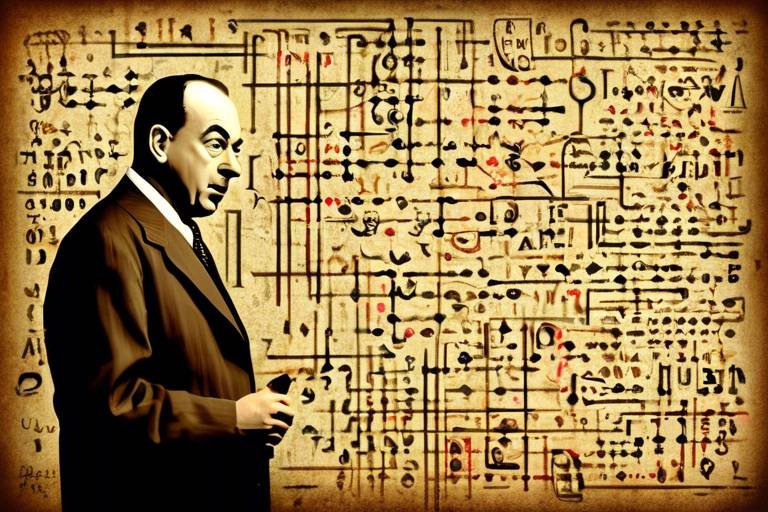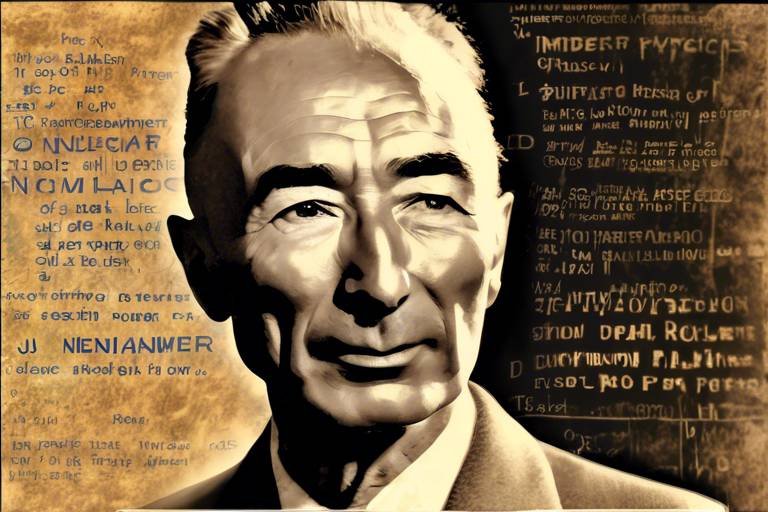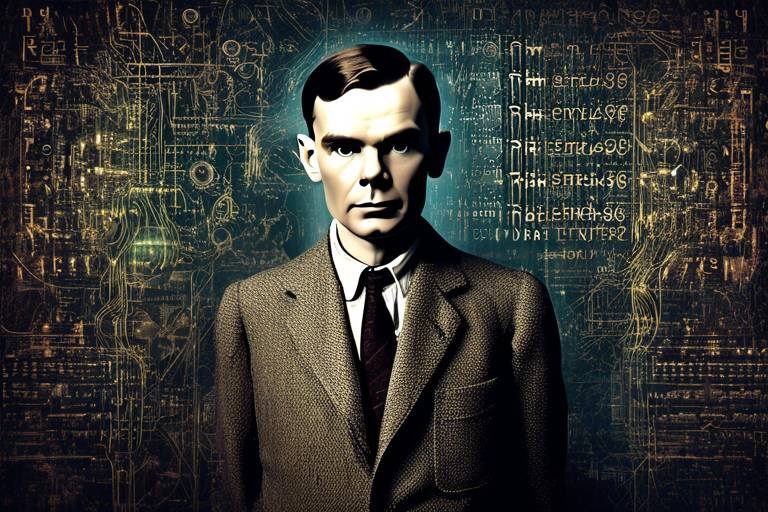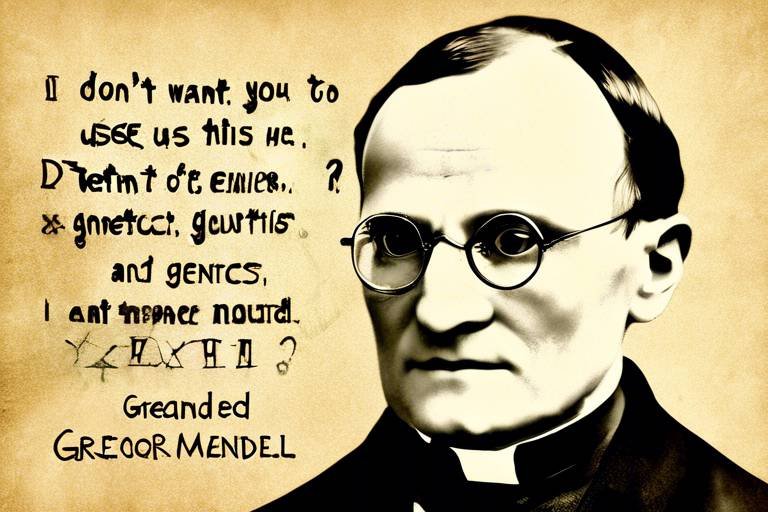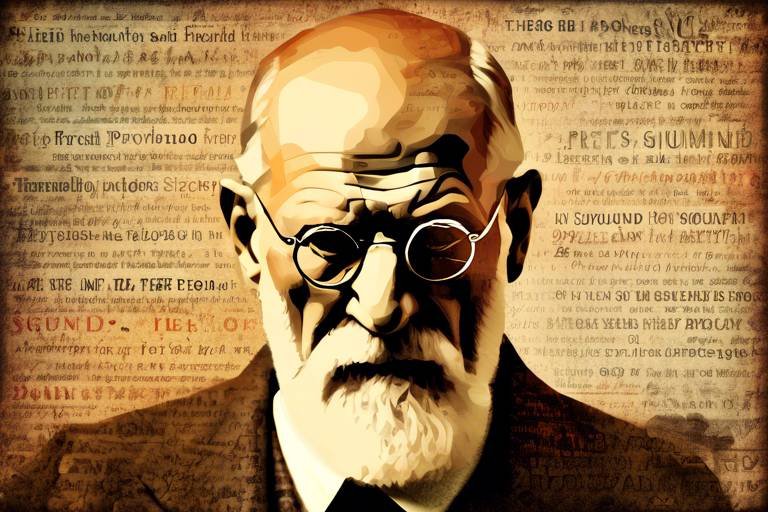The Discoveries of John von Neumann in Game Theory
John von Neumann, a name synonymous with innovation and intellect, made groundbreaking contributions to the field of game theory that continue to influence various domains today. Imagine a chess game where every move is not just a play but a calculated strategy based on the possible responses of the opponent. This is the essence of game theory, and von Neumann was the architect of its foundational principles. His work transformed our understanding of strategic interactions, not just in games, but in real-world scenarios ranging from economics to military strategy.
At its core, game theory is about understanding how rational decision-makers interact in competitive situations. Von Neumann's insights provided a framework for analyzing these interactions, revealing the underlying patterns of behavior that govern decision-making processes. His pioneering work laid the groundwork for a discipline that would become crucial in various fields, including economics, political science, and even biological sciences. The implications of his discoveries are vast, enabling us to better navigate the complexities of competition and cooperation in everyday life.
One of von Neumann's most significant contributions is the minimax theorem, which offers a strategy for minimizing potential losses in scenarios where one player's gain is another's loss. This theorem not only provides insight into zero-sum games but also extends its relevance to broader economic and strategic decision-making contexts. By establishing this theorem, von Neumann opened the door to a new way of thinking about conflict and cooperation, allowing individuals and organizations to strategize effectively in competitive environments.
The implications of von Neumann's work are not merely theoretical; they have practical applications that resonate today. For instance, in the realm of economics, his theories have been instrumental in shaping market strategies, auctions, and negotiations. Businesses leverage these insights to devise competitive tactics that enhance their market position. Similarly, in military strategy, game theory principles guide the analysis of conflict situations, informing decision-making processes in defense planning. This cross-disciplinary impact underscores the versatility and relevance of von Neumann's discoveries.
Furthermore, von Neumann's exploration of coalitional game theory introduced the idea of cooperation among players, emphasizing the significance of group dynamics in strategic interactions. This aspect of his work highlights how collaboration can sometimes be as crucial as competition, providing a more nuanced understanding of human behavior in collective settings.
As we delve deeper into the evolution of game theory, we see von Neumann's influence extend into evolutionary game theory. This branch examines strategies in biological contexts, offering insights into competition and cooperation in nature. It’s fascinating to consider how the principles derived from mathematical games can illuminate the behaviors of animals in their natural habitats. For example, evolutionary game theory has provided explanations for behaviors such as altruism and aggression in species, showcasing the broad applicability of von Neumann's theories.
In conclusion, the legacy of John von Neumann in the realm of game theory is profound and far-reaching. His discoveries have not only shaped modern economics, political science, and psychology but have also inspired future generations of researchers and theorists. As we continue to explore the complexities of human interaction, the foundational concepts he established remain invaluable tools in our quest for understanding strategic decision-making.
- What is game theory? Game theory is a mathematical framework for analyzing strategic interactions among rational decision-makers.
- Who is John von Neumann? John von Neumann was a Hungarian-American mathematician, physicist, and polymath who made significant contributions to various fields, including game theory.
- What is the minimax theorem? The minimax theorem provides a strategy for minimizing losses in zero-sum games, where one player's gain is another's loss.
- How does game theory apply to economics? Game theory is used in economics to analyze market strategies, auctions, and negotiations, helping businesses make informed decisions.
- What is evolutionary game theory? Evolutionary game theory studies strategies in biological contexts, shedding light on competition and cooperation in nature.

The Foundations of Game Theory
John von Neumann is often hailed as the father of game theory, and for good reason. His pioneering work laid the essential foundation for understanding how individuals and organizations make decisions in competitive situations. Imagine a chess game: each player must consider not only their own strategies but also anticipate their opponent's moves. This intricate dance of strategy is what von Neumann sought to formalize through mathematical principles.
At its core, game theory studies strategic interactions where the outcome for each participant depends not just on their own actions but also on the actions of others. Von Neumann's insights were revolutionary because they provided a framework to analyze these interactions systematically. He introduced key concepts such as rationality, where players are assumed to make decisions that maximize their payoffs, and dominance, which describes strategies that are superior regardless of what opponents do.
One of the most profound aspects of von Neumann's work is the idea that players can be classified based on their strategic behavior. These classifications help in understanding various types of games, which can be broadly categorized into:
- Cooperative Games - where players can form alliances and work together to achieve better outcomes.
- Non-Cooperative Games - where players act independently, often leading to competition.
This classification is crucial because it determines the strategies players will adopt. In cooperative games, for instance, players might negotiate to share resources or benefits, while in non-cooperative scenarios, the focus shifts to individual strategies aimed at outmaneuvering opponents.
Von Neumann's legacy in game theory extends beyond theoretical constructs; it has practical applications across various fields, including economics, political science, and psychology. His work has influenced how we understand market dynamics, negotiations, and even social interactions. The implications of his theories can be seen in diverse areas such as auctions, where bidders strategize based on their knowledge of competitors, or in political campaigns, where candidates must anticipate opponents' moves to win votes.
In summary, the foundations laid by John von Neumann in game theory not only transformed the field of mathematics but also provided invaluable insights into human behavior and decision-making. His ideas continue to resonate, shaping the way we analyze competitive situations in everyday life. As we delve deeper into his contributions, we will uncover more about the specific principles he introduced, such as the minimax theorem and its applications in various domains.
- What is game theory? - Game theory is a mathematical framework for analyzing strategic interactions among rational decision-makers.
- Who is John von Neumann? - John von Neumann was a Hungarian-American mathematician, physicist, and computer scientist who made significant contributions to various fields, including game theory.
- What are zero-sum games? - Zero-sum games are situations in which one player's gain is exactly balanced by another player's loss.
- How is game theory applied in economics? - Game theory is used in economics to model and analyze competitive behaviors in markets, auctions, and negotiations.

Minimax Theorem
The stands as one of the cornerstones of game theory, a brilliant insight from the mind of John von Neumann. At its core, this theorem provides a strategy that allows players to minimize their maximum possible losses in a competitive setting. Imagine you're playing a game of chess; your goal is not just to win but also to protect yourself from the worst-case scenario. This is exactly what the minimax theorem addresses—it’s about making the best possible move while considering your opponent's best counter-move.
To understand the minimax theorem more deeply, let’s break it down into its essential elements. The theorem applies primarily to zero-sum games, where one player's gain is another's loss. In such scenarios, every decision made by one player directly impacts the other. The minimax strategy encourages players to think ahead, weighing their options and anticipating their opponent's actions. In essence, it’s a battle of wits where the objective is to outsmart your rival while safeguarding your own interests.
Here’s a simple example: consider a two-player game where each player can choose between two strategies—A and B. The outcomes can be represented in a payoff matrix:
| Player 2 | A | B |
|---|---|---|
| Player 1 | (3, -3) | (0, 0) |
| Player 1 | (-1, 1) | (2, -2) |
In this matrix, the first number in each cell represents the payoff for Player 1, while the second number represents the payoff for Player 2. By applying the minimax theorem, Player 1 will look for a strategy that maximizes their minimum gain while minimizing the maximum loss. This strategic thinking is crucial in many fields, from economics to psychology, where decision-making often involves risk assessment and competitive dynamics.
The implications of the minimax theorem extend beyond mere games; they resonate in various domains such as economics, where businesses must navigate competitive markets, and in politics, where candidates strategize to win elections. The theorem also finds applications in areas like negotiations and auctions, where understanding the opponent’s strategy can lead to more favorable outcomes.
In summary, the minimax theorem not only provides a framework for understanding competitive behavior but also equips individuals and organizations with the tools to make informed decisions in uncertain environments. It’s a powerful reminder that in the game of life, just like in chess, the best defense can often lead to the greatest offense.
- What is the minimax theorem? The minimax theorem is a principle in game theory that suggests players can minimize their maximum losses in competitive scenarios, particularly in zero-sum games.
- How does the minimax theorem apply to real-world situations? It is widely used in economics, military strategy, and negotiations, helping individuals and organizations make informed decisions under uncertainty.
- Can the minimax theorem be used in non-zero-sum games? While primarily designed for zero-sum games, the concepts can be adapted to analyze competitive interactions in non-zero-sum scenarios as well.

Zero-Sum Games
When we think about competition, the term zero-sum game often springs to mind. Imagine a scenario where one person's gain is precisely equal to another's loss—like a tug-of-war where each inch gained by one side is an inch lost by the other. This concept, rigorously explored by John von Neumann, serves as a cornerstone of game theory, illustrating a fundamental aspect of strategic interactions. In a zero-sum game, the total benefit available to all players remains constant; thus, the game is framed in a way that every advantage one player achieves directly translates to a disadvantage for another.
To better understand this, consider the classic example of a poker game. The total amount of money in the pot is fixed, and the players vie for this amount. If one player wins, their gain is equal to the losses of the others. This competitive dynamic highlights the essence of zero-sum games, where the interests of players are completely opposed.
Von Neumann's analysis of these scenarios led to the formulation of strategies that players can employ to optimize their chances of winning. One key strategy is the minimax strategy, which aims to minimize the maximum possible loss. This approach is crucial in zero-sum games, as players must anticipate their opponents' moves while simultaneously planning their own. The minimax theorem states that in a zero-sum game, there exists a strategy that guarantees the best outcome for a player, regardless of the opponent's actions. This theorem not only provides a mathematical foundation for strategic decision-making but also ensures that players can make informed choices based on rational analysis.
Zero-sum games are not just theoretical constructs; they manifest in various real-world scenarios, including:
- Negotiations, where one party's concession is another's gain.
- Sports competitions, where victory for one team means defeat for another.
- Market competitions, where companies vie for the same customer base, resulting in a finite pool of resources.
Understanding the dynamics of zero-sum games is essential for anyone involved in competitive environments. Von Neumann's pioneering work has influenced not just economics, but also fields like political science and military strategy, where the stakes can be incredibly high. In military contexts, for example, commanders often analyze conflict situations as zero-sum games, weighing strategies that minimize their losses while maximizing their opponents' vulnerabilities.
In conclusion, the concept of zero-sum games, as established by John von Neumann, provides invaluable insights into competitive behavior. By recognizing that every gain comes at a cost to another, individuals and organizations can better navigate the complexities of strategic interactions, whether in business, sports, or even interpersonal relationships.

Applications in Economics
John von Neumann's groundbreaking theories in game theory have had a profound impact on the field of economics, reshaping how economists analyze market behaviors and strategic interactions. His insights have paved the way for a deeper understanding of competitive dynamics, influencing a variety of economic applications. One of the most significant aspects of his work is the way it provides a framework for understanding how individuals and firms make decisions in competitive environments.
For instance, in market strategies, von Neumann's principles help economists predict how businesses will react to changes in pricing strategies, product launches, or even regulatory shifts. When companies are aware of their competitors' potential moves, they can better position themselves to maximize their own profits. This strategic thinking is crucial in industries such as telecommunications, pharmaceuticals, and finance, where the stakes are high and the competition is fierce.
Moreover, von Neumann's theories have been instrumental in auction design and bidding strategies. By applying game theory, economists can analyze how bidders will behave in various auction formats, leading to more efficient outcomes. For example, in a sealed-bid auction, understanding the potential strategies of other bidders can significantly influence an individual's bidding strategy. This application is not just theoretical; it has real-world implications in government contracts, art auctions, and even online marketplaces.
In negotiations, whether in business or international relations, game theory provides tools for understanding the strategic interactions between parties. Von Neumann's models allow negotiators to anticipate the moves of their opponents and adjust their strategies accordingly. This can lead to more favorable outcomes, as parties can find ways to cooperate or compete effectively, depending on the context.
To illustrate the diverse applications of game theory in economics, consider the following table that summarizes key areas where von Neumann's contributions have made a significant impact:
| Application Area | Description |
|---|---|
| Market Strategies | Analyzing competitive behaviors to optimize pricing and product positioning. |
| Auction Design | Understanding bidder behavior to create efficient auction formats. |
| Negotiations | Using strategic interactions to enhance outcomes in business and diplomacy. |
| Regulatory Impact | Assessing how changes in regulations affect competitive strategies. |
In conclusion, the applications of von Neumann's theories in economics are extensive and varied, providing valuable insights into how strategic interactions shape market behaviors. His work not only enhances our understanding of competitive dynamics but also equips economists with the tools to analyze and predict outcomes in a complex economic landscape.
- What is game theory? Game theory is a mathematical framework for analyzing strategic interactions among rational decision-makers.
- How did von Neumann contribute to game theory? He established foundational concepts and models, such as the minimax theorem, that revolutionized the understanding of competitive behavior.
- What are zero-sum games? Zero-sum games are scenarios where one player's gain is exactly equal to another's loss, illustrating extreme competition.
- How is game theory applied in real life? Game theory is used in various fields, including economics, military strategy, and biology, to analyze competitive and cooperative behaviors.

Impacts on Military Strategy
John von Neumann's revolutionary insights into game theory have significantly impacted military strategy, providing a robust framework for analyzing conflict situations and decision-making processes. Imagine a chessboard where each move not only affects the immediate position but also influences the entire game. This is akin to how military strategists utilize game theory to anticipate opponents' actions and devise counter-strategies. The principles of game theory allow military planners to evaluate various scenarios, weighing the potential outcomes of their decisions against the possible responses of adversaries.
One of the most compelling applications of von Neumann's theories in military strategy is the concept of deterrence. By understanding the motivations and possible actions of opponents, military leaders can create strategies that discourage aggressive actions through the threat of retaliation. This is particularly evident in nuclear strategy, where the balance of power is delicately maintained through the threat of mutually assured destruction (MAD). In this context, game theory becomes a tool for maintaining peace, as the costs of conflict outweigh the benefits for all parties involved.
Moreover, von Neumann's work highlights the importance of information and communication in strategic decision-making. In military operations, the ability to gather and analyze intelligence can be the difference between victory and defeat. Game theory provides a framework for understanding how information asymmetries can affect strategy. For instance, if one side has superior intelligence about the other's capabilities or intentions, it can leverage that advantage to achieve better outcomes. This dynamic creates a complex web of interactions where deception, signaling, and information sharing play crucial roles.
To illustrate the impacts of game theory on military strategy, consider the following table that summarizes key applications:
| Application | Description |
|---|---|
| Deterrence | Using threats of retaliation to prevent aggression. |
| Strategic Planning | Evaluating different scenarios to optimize military operations. |
| Information Warfare | Leveraging intelligence to gain strategic advantages. |
| Coalition Building | Forming alliances based on mutual interests and benefits. |
In essence, von Neumann's contributions to game theory have not only reshaped our understanding of economics and social sciences but have also provided invaluable insights into military strategy. His work emphasizes that in the theater of war, just as in any game, the ability to predict and counteract an opponent's moves is paramount. The lasting influence of his theories continues to guide military strategists as they navigate the complexities of modern warfare.
- How did John von Neumann contribute to military strategy?
Von Neumann's game theory provided frameworks for understanding conflict, deterrence, and strategic decision-making, which are crucial in military operations. - What is the significance of deterrence in military strategy?
Deterrence aims to prevent aggression by threatening retaliation, maintaining peace through the fear of mutually assured destruction. - How does information affect military strategy?
Information asymmetries can significantly influence strategic decisions, making intelligence gathering and analysis vital for success in military operations.

Coalitional Game Theory
Coalitional game theory, a fascinating extension of traditional game theory, dives deep into the dynamics of cooperation among players. Unlike the typical competitive scenarios where players act independently, coalitional game theory emphasizes the power of collaboration. Imagine a group of friends deciding to pool their resources to buy a concert ticket; together, they can achieve a goal that might be unattainable individually. This principle is at the heart of coalitional game theory, where the focus shifts from individual strategies to collective outcomes.
John von Neumann's pioneering work in this area has had profound implications across various fields, notably in economics and political science. He introduced the concept of the core, a set of outcomes that can be achieved through cooperation, ensuring that no group of players would be better off by breaking away from the coalition. This concept is crucial because it establishes a baseline for evaluating the stability of coalitions. In simpler terms, if a group can achieve a better result by working together than by acting alone, they are more likely to form a coalition.
To illustrate this, consider the following
| Concept | Description |
|---|---|
| Coalition | A group of players who work together to achieve a common goal. |
| Core | The set of outcomes where no subgroup of players would benefit from leaving the coalition. |
| Shapley Value | A method for distributing payoffs among players based on their contribution to the coalition. |
| Stable Set | A collection of outcomes where no player has an incentive to deviate. |
Furthermore, the application of coalitional game theory can be seen in various real-world scenarios, such as political alliances, business partnerships, and even international relations. For example, in politics, parties often form coalitions to gain a majority in legislative bodies. The stability of these coalitions can be analyzed through the lens of the core, helping to predict whether they will hold together or fracture under pressure.
In business, companies may join forces to tackle large projects or enter new markets. The Shapley value, another critical concept introduced by von Neumann, can help determine how to fairly divide the profits generated by such collaborations. This approach not only fosters cooperation but also ensures that all parties feel valued, which is essential for long-term partnerships.
Ultimately, von Neumann's insights into coalitional game theory have reshaped our understanding of strategic interactions. By recognizing the importance of collaboration, we can better navigate the complexities of human behavior, whether in economics, politics, or social settings. The beauty of this theory lies in its ability to transform competition into cooperation, highlighting that sometimes, the best strategy is to work together for mutual benefit.
- What is coalitional game theory? Coalitional game theory studies how groups of players can form coalitions to achieve better outcomes than they could individually.
- What is the core in coalitional game theory? The core refers to a set of outcomes in which no subgroup of players would be better off by leaving the coalition.
- How does the Shapley value work? The Shapley value is a method of distributing payoffs among players based on their contributions to the coalition.
- Where can coalitional game theory be applied? It can be applied in various fields, including economics, political science, and business strategy.

Evolutionary Game Theory
When we think about game theory, we often picture high-stakes negotiations or fierce economic competition. But did you know that the principles laid down by John von Neumann extend far beyond the boardroom and into the very fabric of life itself? That's right! The fascinating realm of explores how these mathematical concepts apply to biological systems, offering profound insights into the strategies that organisms use to survive and thrive in their environments.
At its core, evolutionary game theory examines the interactions between competing species or individuals, treating these encounters as strategic games. Imagine a bustling forest where different animals are constantly vying for resources like food, mates, and territory. In this setting, each species must develop strategies that maximize their chances of survival, much like players in a game trying to outsmart their opponents. This analogy helps us grasp how these strategies evolve over time, influenced by factors such as competition, cooperation, and environmental changes.
One of the most intriguing aspects of evolutionary game theory is its ability to explain behaviors that might seem counterintuitive at first glance. For instance, why would a lion share its kill with other members of its pride? It turns out that cooperation can enhance the survival of the group, ultimately benefiting the individual. This phenomenon is often analyzed through the lens of the prisoner's dilemma, a classic game theory scenario that illustrates how two players might not cooperate even if it appears that it is in their best interest to do so. In nature, however, the stakes are higher, and the dynamics are more complex.
To better understand these dynamics, researchers have developed models that simulate various scenarios in which organisms compete or cooperate. These models reveal that certain strategies can lead to stable populations, while others may result in extinction. For example, the Hawk-Dove game is a well-known model that describes the conflict between aggressive ("Hawk") and peaceful ("Dove") strategies. The outcomes of these interactions depend on the payoffs associated with fighting and sharing resources, showcasing how evolutionary pressures shape behavior.
| Strategy | Description | Outcome |
|---|---|---|
| Hawk | A strategy that involves aggressive behavior to claim resources. | High risk of injury but potentially high rewards. |
| Dove | A strategy that involves peaceful behavior and sharing resources. | Lower risk of injury but potentially lower rewards. |
These models not only help us understand animal behavior but also have implications for human social dynamics. In fact, the principles of evolutionary game theory can be seen in various aspects of human interaction, from economics to political science. Just like animals, humans must navigate a world filled with competition and cooperation, adapting their strategies based on the behavior of others.
As we delve deeper into the implications of evolutionary game theory, it's clear that von Neumann's contributions have left an indelible mark on multiple disciplines. By bridging the gap between economics and biology, his work has paved the way for a richer understanding of how strategies evolve in response to environmental pressures. So, the next time you observe a competitive interaction in nature or in your daily life, remember that behind those choices lies a complex web of strategic thinking, much like a game of chess played on a grand scale.
- What is evolutionary game theory?
Evolutionary game theory is a framework that applies the principles of game theory to biological contexts, analyzing how strategies evolve among competing organisms. - How does it differ from classical game theory?
While classical game theory focuses on rational decision-making among humans, evolutionary game theory considers the biological and environmental factors that influence the strategies of organisms. - Can evolutionary game theory be applied to human behavior?
Yes, the principles of evolutionary game theory can be applied to understand human social interactions, economics, and political strategies.

Biological Applications
When we think of game theory, our minds might immediately drift to economics or military strategy, but its applications stretch far beyond those realms. One fascinating area where John von Neumann's theories have made a significant impact is in the field of biology. In fact, the principles of game theory are not just abstract concepts; they provide crucial insights into the intricacies of evolutionary strategies and animal behavior.
At its core, evolutionary game theory examines how organisms interact with one another in a competitive environment. Just like players in a game, animals must make decisions that can affect their survival and reproductive success. For instance, consider the classic example of the Hawk-Dove game, which models strategies for conflict resolution among animals. In this scenario, individuals can adopt one of two strategies:
| Strategy | Description | Outcome |
|---|---|---|
| Hawk | A strategy where the individual fights for resources. | Wins against Doves but can get injured in fights against other Hawks. |
| Dove | A strategy where the individual avoids conflict and displays peaceful behavior. | Shares resources with other Doves but loses to Hawks. |
This model illustrates how different strategies can coexist within a population, leading to a balance of behaviors that reflects the environmental pressures faced by the species. The outcome of such interactions can significantly influence not only individual survival but also the evolutionary trajectory of the entire species.
Moreover, von Neumann's insights can be applied to various biological phenomena, including:
- Cooperation in Social Species: Game theory helps explain why certain species, like bees or ants, exhibit cooperative behavior, working together for the greater good of the colony.
- Mate Selection: The strategies animals use to attract mates can be analyzed through game-theoretic models, revealing the complex interplay of competition and cooperation in reproductive success.
- Resource Allocation: Animals often face choices about how to allocate their time and energy among competing needs, such as foraging, mating, and avoiding predators, which can be understood through game theory.
In summary, the biological applications of game theory, particularly those stemming from von Neumann's work, provide a robust framework for understanding the dynamics of competition and cooperation in nature. By applying these concepts, researchers can gain a deeper understanding of how evolutionary pressures shape behavior and survival strategies across diverse species.
1. What is game theory?
Game theory is a mathematical framework for analyzing strategic interactions among rational decision-makers. It is used to model situations where the outcome depends on the actions of multiple agents.
2. How did John von Neumann contribute to game theory?
John von Neumann is considered one of the founders of game theory. He established key concepts, such as the minimax theorem and zero-sum games, which have had a profound impact on economics, military strategy, and biology.
3. What are zero-sum games?
Zero-sum games are situations in which one player's gain is exactly balanced by another player's loss. This concept is essential in competitive scenarios, such as poker or sports.
4. How is game theory applied in biology?
In biology, game theory is used to study evolutionary strategies, animal behavior, and cooperation among species, helping researchers understand how organisms adapt to their environments.
5. What is the Hawk-Dove game?
The Hawk-Dove game is a model that describes how animals can adopt aggressive (Hawk) or peaceful (Dove) strategies in conflicts over resources, illustrating the balance of behaviors in a population.

Legacy and Influence
John von Neumann's discoveries in game theory have had a profound and enduring impact across various disciplines, shaping the way we understand strategic interactions in economics, political science, and psychology. His work not only laid the groundwork for modern game theory but also inspired a multitude of applications that continue to evolve and adapt in today's complex world. Imagine a vast web of interconnected ideas, where von Neumann's theories serve as the foundational threads that hold everything together. This legacy is not just about the past; it's a living, breathing influence that informs current research and practice.
One of the most significant aspects of von Neumann's legacy is his ability to bridge the gap between abstract mathematical concepts and practical applications. His theories have been instrumental in developing strategies for various real-world situations, including:
- Market Strategies: Businesses utilize game theory to anticipate competitor actions and optimize their pricing strategies, ensuring they remain competitive in an ever-changing marketplace.
- Negotiations: Whether in corporate mergers or international diplomacy, understanding the strategic moves of opponents can lead to more favorable outcomes.
- Political Science: Game theory helps in analyzing electoral strategies and public policy decisions, offering insights into voter behavior and coalition-building.
Moreover, von Neumann's influence extends beyond these fields into the realm of artificial intelligence and machine learning. As AI systems increasingly rely on decision-making algorithms, the principles of game theory provide a framework for understanding how these systems can interact with one another and with humans. This intersection of technology and game theory is paving the way for innovations that could reshape industries and our daily lives.
In the academic world, von Neumann's work continues to inspire new generations of researchers. His pioneering spirit encourages scholars to explore uncharted territories in strategic decision-making, leading to advancements in both theoretical and applied game theory. The interdisciplinary nature of his contributions fosters collaboration among economists, biologists, and social scientists, creating a rich tapestry of knowledge that transcends traditional boundaries.
To summarize, John von Neumann's legacy is not merely a historical footnote; it is a vibrant and essential part of contemporary thought. His insights into human behavior and strategic interaction resonate through various domains, making them relevant even in today's complex and interconnected society. As we continue to navigate the challenges of the modern world, the principles of game theory remain a guiding light, illuminating paths to cooperation, competition, and ultimately, understanding.
1. What is game theory?
Game theory is a mathematical framework for analyzing situations in which players make decisions that are interdependent. It helps in understanding strategic interactions where the outcome for each participant depends on the actions of others.
2. How did John von Neumann contribute to game theory?
John von Neumann is considered one of the founders of game theory. He developed key concepts such as the minimax theorem and explored various types of games, including zero-sum and coalitional games, establishing a foundation for future research.
3. What are some real-world applications of game theory?
Game theory has applications in economics, political science, biology, and artificial intelligence. It is used in market analysis, negotiation strategies, conflict resolution, and understanding evolutionary behavior.
4. What is the minimax theorem?
The minimax theorem is a principle in game theory that provides a strategy for minimizing the maximum possible loss in zero-sum games. It is crucial for strategic decision-making in competitive environments.
5. How has game theory influenced modern economics?
Game theory has revolutionized economic theory by providing tools to analyze market behaviors, auctions, and negotiations, allowing economists to predict outcomes based on strategic interactions among agents.
Frequently Asked Questions
- What is game theory?
Game theory is a mathematical framework for analyzing strategic interactions among rational decision-makers. It helps us understand how individuals or groups make decisions when their outcomes depend on the choices of others.
- Who is John von Neumann?
John von Neumann was a Hungarian-American mathematician, physicist, and polymath, renowned for his foundational contributions to various fields, including game theory, computer science, and quantum mechanics. His work laid the groundwork for modern strategic thinking.
- What is the minimax theorem?
The minimax theorem is a key principle in game theory introduced by von Neumann. It provides a strategy for minimizing the maximum possible loss in zero-sum games, where one player's gain is exactly balanced by another's loss.
- What are zero-sum games?
Zero-sum games are situations in which one participant's gain or loss is exactly equal to the losses or gains of other participants. This concept is crucial in understanding competitive scenarios, as it highlights the direct conflict of interests among players.
- How has game theory impacted economics?
Game theory has significantly influenced economics by providing insights into market strategies, negotiations, and auction designs. It helps economists model competitive behavior and predict outcomes in various economic scenarios.
- In what ways is game theory used in military strategy?
Game theory is utilized in military strategy to analyze conflict situations and improve decision-making processes. It aids in understanding the strategic interactions between opposing forces, thereby enhancing defense planning and operational effectiveness.
- What is coalitional game theory?
Coalitional game theory focuses on how groups of players can cooperate to achieve better outcomes than they could individually. Von Neumann's exploration of this area emphasizes the importance of collaboration and coalition formation in strategic interactions.
- What is evolutionary game theory?
Evolutionary game theory extends traditional game theory concepts into biological contexts, examining how strategies evolve over time through competition and cooperation among species. It provides valuable insights into animal behavior and evolutionary processes.
- How does von Neumann's work influence modern research?
Von Neumann's discoveries in game theory have shaped various fields, including economics, political science, and psychology. His theories continue to inspire researchers and theorists, driving advancements in strategic decision-making and analysis.

